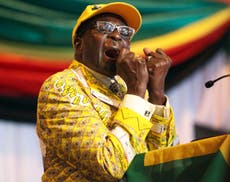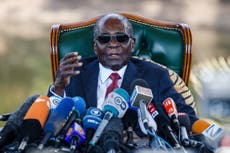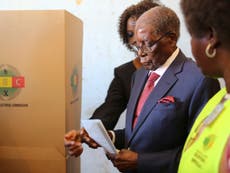I can see why Africans love Robert Mugabe, but Zimbabwe deserved more than violence and fear
He remains an African icon but his legacy is a broken, traumatised country that’s struggling to create an identity separate from him

In the history of Africa’s liberation struggle, there are a few names that inspire praise, acclaim and admiration for their roles. Robert Gabriel Mugabe was one of those names.
He was a shrewd politician and powerful orator, he is a man who shines as an example of black self-determination and Pan-African pride. With the announcement of his death earlier today, there was a genuine outpouring of grief at the loss of a giant.
Africans (and some African-Americans) hailed Mugabe as a revolutionary, a man who stood up to the imperial West and dared to fight for the pride and dignity of his people.
If only that shining ideal matched with the realities Zimbabweans endured under his rule.
On one hand, I can understand why non-Zimbabweans romanticise Mugabe and his legacy. After all, the only Mugabe they know is the one from his speeches.
When he stood at the podium, everyone hushed to hear what he had to say. He railed against Western imperialism, taking particular aim at Britain. He refused to be timid and chose to call people out by name, specifically Tony Blair and George W. Bush. It’s a stance that earned him diehard fans across Africa.
In a continent with a history of indecisive leadership that pandered to America and former colonial powers, Mugabe appeared to be the ideal black African leader. The land reform programme, beginning near the end of the 20th century, only made him more popular. Here was a black liberation hero securing economic emancipation for his people and removing the last stronghold of white minority rule.
Already beloved, Mugabe the hero became Mugabe the martyr when foreign companies and banks pulled out of Zimbabwe. He was the victim in the story, being punished for his resolve to serve his country.
Mugabe was, and is, deeply loved and respected by many fellow Africans. He remains an inspiration to aspiring politicians and activists frustrated by the failed project of decolonisation. He is revered for his rousing speeches and speaking truth to power. I understand that admiration, I do. But it’s an admiration that ignores so much.
Yes, Mugabe was a powerful orator. His words could move and inspire and motivate. He also used his speeches to attack people in his own country. He regularly went after opposition parties in Zimbabwe, accusing them of being enemy agents on the payroll of the all-evil West. He made fun of women’s rights and dismissed pleas for government action on domestic violence, equal pay and sexual harassment.
Yes, Mugabe was a key figure in the fight for Independence and freedom for black majority. He also introduced a culture of fear and silence, to the extent that people were afraid to speak his name aloud or use his name in social media posts. They were afraid of being arrested, being beaten up, or just disappearing.
Yes, in 1980 Mugabe proclaimed that never again would his country endure such trauma and violence. Thirty nine years later, he leaves behind a country with a post-independence history of repression, mass killings, and the use of military and police force against unarmed civilians.
Yes, Mugabe is regarded as a symbol of Pan-Africanism. He also profited off the 1990s civil war in the Democratic Republic of Congo, exacerbating an already turbulent situation by sending troops to prop up then-ruler Laurent Kabila.
Yes, Mugabe’s land reform programme was wildly popular across the continent. It was also poorly executed, with top politicians rushing to take prime land at the expense of black, skilled farmers who didn’t have political connections.
Yes, Mugabe was lauded as the most educated African politician most. He also oversaw the slow collapse of his country, the crash of the national currency, a cholera outbreak in 2008, a mass exodus of Zimbabweans fleeing the country, and corruption scandals that implicated top government officials.
Mugabe is an African icon. There’s no denying that. And for the continent’s psyche, he represents the kind of powerful, intelligent leader that many of us crave. But this shining ideal is simply not true.
He was a man responsible for unspeakable horrors. His legacy is a broken, traumatised country that’s struggling to create an identity separate from him.
He created and entrenched a culture of violence, intimidation and fear. There are many people who deserve praise and acclaim for their contribution to African history and development. Mugabe is not one of them. In discussing his life and his contributions, the pain and experiences of the people who lived under his rule take precedence.
Let’s remember him for who he truly was as a leader, not what some would want him to be.





Join our commenting forum
Join thought-provoking conversations, follow other Independent readers and see their replies